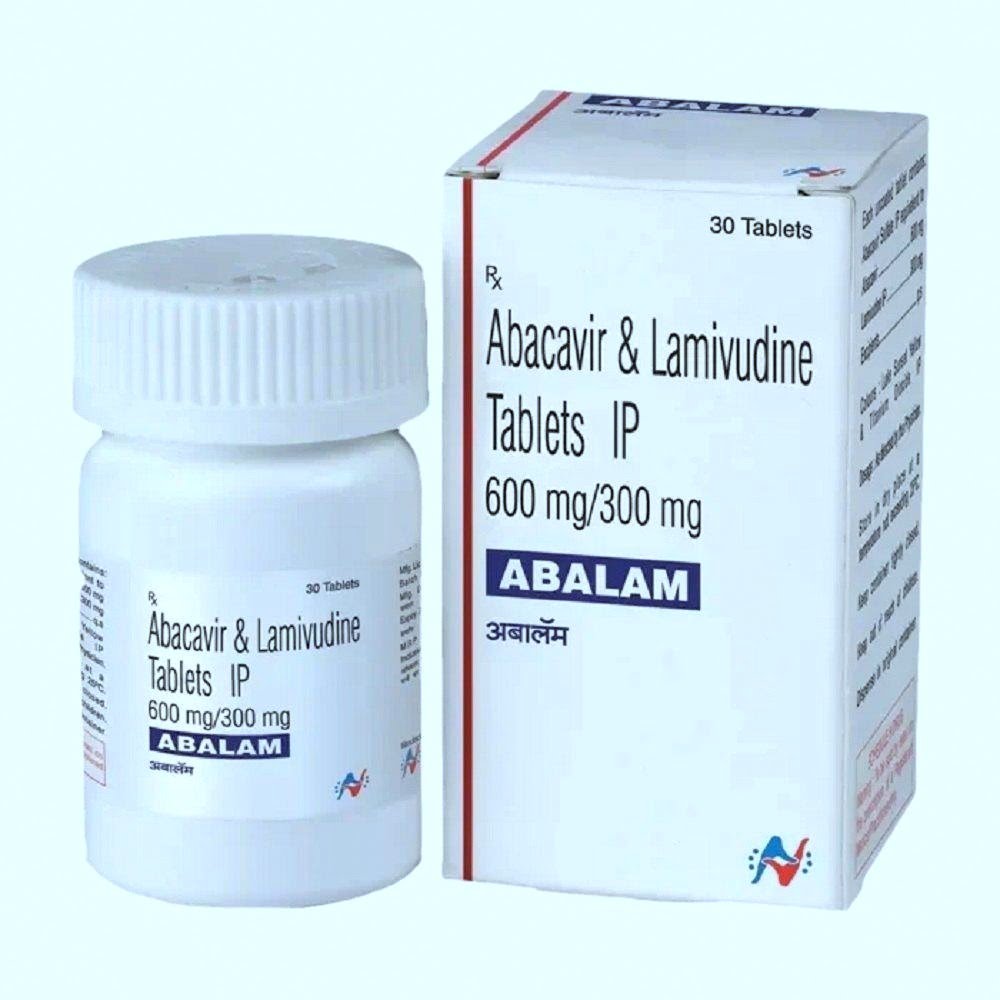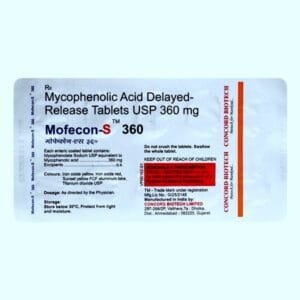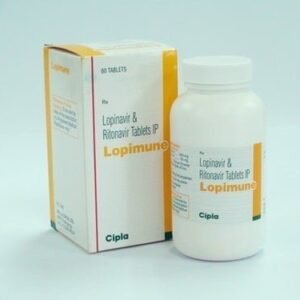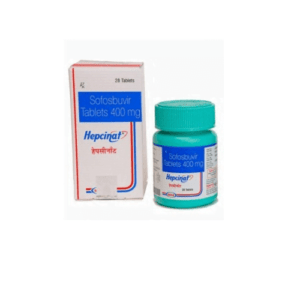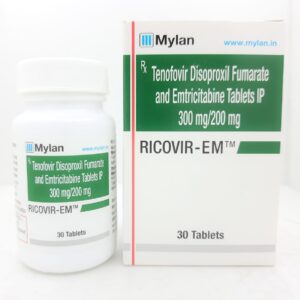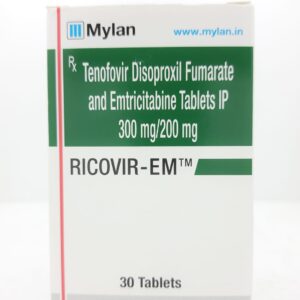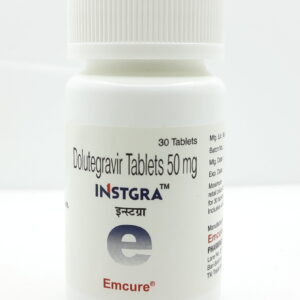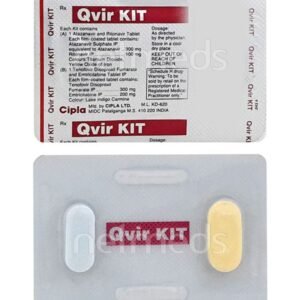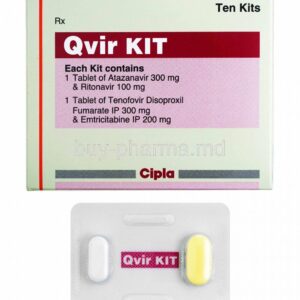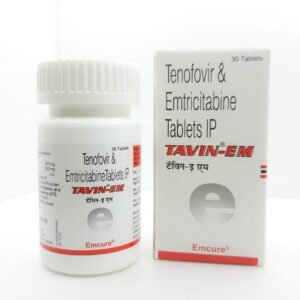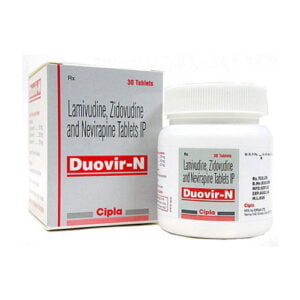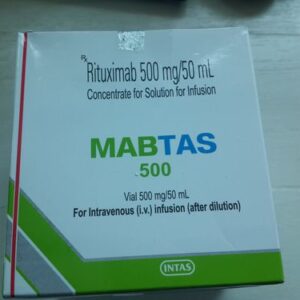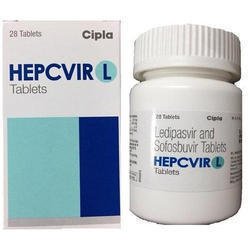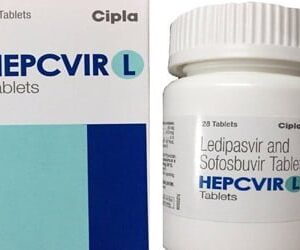Last Updated on September 15, 2024 by admin
Introduction to Abalam Tablet
Abalam Tablet is a prescription medication primarily used in the treatment of human immunodeficiency virus (HIV), which is the virus responsible for acquired immunodeficiency syndrome (AIDS). As an antiretroviral medication, Abalam Tablet is crucial in managing HIV and enhancing the quality of life for individuals living with the virus. It is classified as a combination therapy, which means it contains more than one active ingredient that works synergistically to combat the viral infection.
The two main active ingredients in Abalam Tablet are Abacavir and Lamivudine. Abacavir belongs to a class of drugs known as nucleoside reverse transcriptase inhibitors (NRTIs), which function by interfering with the virus’s ability to replicate itself. By blocking the reverse transcriptase enzyme, Abacavir effectively reduces the viral load in the bloodstream. On the other hand, Lamivudine also falls into the category of NRTIs and shares a similar mechanism of action, further strengthening the medication’s efficacy in suppressing HIV.
Abalam Tablet is often prescribed as part of a comprehensive antiretroviral therapy regimen, which may include other classes of medications to provide a well-rounded approach to managing HIV. The combination of Abacavir and Lamivudine not only assists in reducing the virus’s capacity to multiply but also supports the immune system in coping with the impacts of HIV. Patients taking Abalam Tablet typically benefit from a once-daily pill dosage, making adherence to the treatment plan simpler and more convenient.
As with any medication, it is important for individuals considering Abalam Tablet to consult healthcare professionals to understand the potential benefits and risks associated with its use. Through managed treatment with Abalam Tablet, individuals with HIV can work towards maintaining a sustained viral suppression and improving their overall health outcomes.
Uses of Abalam Tablet
Abalam Tablet is a prescription medication that plays a critical role in the treatment of Human Immunodeficiency Virus type 1 (HIV-1) infection. As a combination therapy, it is specifically formulated to contain two active ingredients: abacavir and lamivudine. This unique composition makes Abalam Tablet an effective option for individuals who are initiating therapy for HIV-1 or looking to optimize their existing treatment regimen. The dual action of abacavir and lamivudine allows for robust suppression of viral replication, which is essential to managing the progression of HIV and improving the overall health of patients.
Primarily, Abalam Tablet is prescribed for adults and children aged 3 months and older who are living with HIV-1. It is particularly beneficial for individuals who may have a high likelihood of developing resistance to other antiviral drugs, making this combination an advantageous option in therapy. Patients with a history of past HIV medications that have failed may also find this treatment effective in providing a new pathway towards viral suppression.
One of the most significant aspects of using Abalam Tablet is its convenience. It is typically taken as a once-daily regimen, which can enhance adherence to treatment protocols. This convenience is crucial in maintaining consistent levels of the drug in the bloodstream, thus maximizing its antiviral effectiveness. While Abalam Tablet alone is not a cure for HIV, when used in conjunction with other antiretroviral medications, it can help to achieve and maintain undetectable viral loads, thereby dramatically improving the quality of life for many individuals. Furthermore, its role in combination therapy underscores the importance of comprehensive treatment plans that address the complexities of HIV care.
Directions for Use
When taking Abalam Tablet, it is essential to adhere to the prescribed dosage and frequency as directed by a healthcare provider. Typically, the recommended dose for adults and children weighing more than 25 kilograms is one tablet taken orally once daily. This tablet contains both abacavir and lamivudine, which work together to manage HIV infection effectively. It is crucial to swallow the tablet whole with or without food, ensuring that it is not chewed or broken, as this can impact its efficacy.
Patients should strive to take Abalam Tablet at the same time each day to establish a consistent routine. This practice not only enhances adherence but also aids in maximizing the medication’s effectiveness. Missing doses can lead to the development of drug-resistant strains of HIV, which underscores the importance of maintaining the prescribed regimen. In case a dose is missed, it should be taken as soon as the patient remembers, unless it is close to the time of the next scheduled dose. In such situations, the missed dose should be skipped, and the regular dosing schedule should be resumed. Doubling up on doses to compensate for a missed one is not advisable.
For individuals who may have pre-existing medical conditions, such as renal impairment, consultations with a healthcare provider regarding dosage adjustments are crucial. Certain factors, such as the patient’s overall health, body weight, and other medications being taken, can influence the appropriate dosage of Abalam Tablet. As such, regular monitoring and follow-up appointments with healthcare providers are necessary to evaluate treatment effectiveness and make any needed adjustments, ensuring optimal management of the condition. Overall, following these directions diligently is vital for those using Abalam Tablet as part of their HIV treatment plan.
Benefits of Abalam Tablet
Abalam Tablet is a combination antiretroviral medication primarily used for the treatment of HIV. Its formulation includes two active ingredients, abacavir and lamivudine, both of which contribute significantly to the management of the virus. One of the most notable benefits of Abalam Tablet is its effectiveness in suppressing viral load, which is crucial for improving the health of individuals living with HIV. By reducing the amount of virus in the body, this medication helps to prevent the progression to AIDS and promotes a longer, healthier life for patients.
Another important advantage of using Abalam Tablet is its impact on enhancing the quality of life for those affected by HIV. Patients report fewer side effects compared to other antiretroviral therapies, which can lead to better adherence to the treatment regimen. This aspect is essential, as consistent use of antiretroviral therapy is key in managing HIV effectively. With reliable suppression of the virus, individuals are less likely to experience opportunistic infections, which can significantly impair their overall well-being.
Moreover, Abalam Tablet plays a critical role in reducing the risk of HIV transmission. Studies indicate that when individuals achieve undetectable viral loads through effective treatment, the likelihood of transmitting the virus to sexual partners is markedly decreased. This underscores the importance of adherence to treatment, not only for personal health but also for public health. As a result, Abalam Tablet not only aids in fighting HIV at the individual level but also contributes to broader efforts to curb the spread of the virus within communities.
In conclusion, the benefits of using Abalam Tablet extend beyond its pharmacological efficacy. Improved quality of life, better treatment adherence, and reduced transmission risk are paramount aspects of its positive impact on individuals living with HIV.
Storage Information
Proper storage of Abalam Tablet is essential to maintain its effectiveness and ensure safety for the user. This medication should be stored at room temperature, ideally between 20°C to 25°C (68°F to 77°F). It is advisable to keep Abalam Tablet away from extreme temperatures, humidity, and direct sunlight, as these conditions can adversely affect the medication’s quality. It is also important to check the expiry date on the packaging and avoid using any medication that has surpassed this date.
Additionally, keeping Abalam Tablet out of the reach of children is of utmost importance. This precaution helps prevent accidental ingestion or misuse, which can pose significant health risks. Parents and caregivers should store the medication in a secure location, preferably in a locked cabinet or container. Doing so not only safeguards the health of young individuals but also ensures that the medication is available for the person who needs it when required.
When you no longer need Abalam Tablet, disposing of it properly is essential to prevent environmental harm or accidental exposure. Many communities have specific disposal programs for medications, which can often be found at local pharmacies or through public health services. If such programs are not available, placing the medication in a sealed plastic bag or container, mixing it with an undesirable substance like used coffee grounds or cat litter, and then throwing it away in the household trash is a recommended method. Furthermore, flushing medications down the toilet is generally discouraged unless instructed by a healthcare provider or disposal guide, as it could contaminate water supplies.
Medicinal Benefits
Abalam Tablet is a medication that combines two antiretroviral drugs, Abacavir and Lamivudine, primarily used in the treatment of HIV. The synergistic effect of these two agents plays a crucial role in inhibiting the replication of the HIV virus within the body. Abacavir is classified as a nucleoside reverse transcriptase inhibitor (NRTI), while Lamivudine also falls under the NRTI category. Together, they interfere with the viral life cycle in multiple ways, contributing significantly to the management of HIV infection.
Abacavir works by competitively inhibiting the reverse transcriptase enzyme, preventing the conversion of viral RNA into DNA. This step is vital for the HIV virus as it allows for the integration of its genetic material into the host’s DNA. By halting this process, Abacavir effectively reduces viral load in the bloodstream. Lamivudine complements this action by also inhibiting reverse transcriptase, further blocking HIV’s ability to replicate and spread within the host. This dual mechanism enhances the overall efficacy of Abalam Tablet, making it a preferred choice for many patients.
Clinical trials have demonstrated that patients receiving Abalam Tablet experience significant reductions in viral loads, often achieving undetectable levels of the virus. These outcomes not only reflect the potency of the medication but also lead to improved immune function, as measured by increases in CD4 cell counts. As a result, patients exhibit better overall health, reduced risk of AIDS-related complications, and enhanced quality of life.
In summary, the combined action of Abacavir and Lamivudine in Abalam Tablet provides a robust defense against HIV. Its proven clinical benefits underscore the importance of these antiretroviral drugs in current HIV treatment regimens, offering hope and improved health outcomes for individuals living with the virus.
Drug Warnings
Abalam Tablet, a combination antiretroviral medication, is prescribed for the treatment of HIV-1 infections. While it can be effective, it is essential to recognize and understand the warnings associated with its use. First and foremost, patients should be aware of potential allergic reactions to Abalam Tablet, which may manifest as skin rashes, itching, or even potentially severe hypersensitivity reactions. Such reactions necessitate immediate medical attention and should be communicated to healthcare providers before the commencement of therapy.
Healthcare practitioners should also monitor for serious side effects that may occur during treatment with Abalam Tablet. These include potential liver issues, which may be indicated by jaundice, dark urine, or persistent abdominal pain. Additionally, individuals with a history of liver disease, especially those co-infected with hepatitis B or C, should exercise caution when prescribed this medication. The risks associated with lactic acidosis, a rare but severe condition, are also prominent. Symptoms can include unusual muscle pain, difficulty breathing, and cold or clammy skin. Regular monitoring and evaluation of symptoms are crucial in mitigating these risks.
Moreover, it is important to note certain contraindications related to the usage of Abalam Tablet. Patients who are hypersensitive to abacavir or lamivudine, the active components of this medication, should avoid its use entirely. Furthermore, individuals who are pregnant or breastfeeding should consult with their healthcare provider to understand the potential risks and benefits effectively. Ultimately, comprehensive guidance from a healthcare provider is essential to ensure the safe and appropriate use of Abalam Tablet, keeping in mind all pertinent warnings and contraindications.
Drug Interactions
Abalam Tablet, a fixed-dose combination therapy containing abacavir and lamivudine, is significantly important in the management of HIV. However, like many medications, it can interact with other drugs, potentially affecting its efficacy and safety. Understanding these drug interactions is crucial for patients currently on Abalam Tablet or considering it as a treatment option.
Firstly, it is essential to note that certain medications can influence the metabolism of the components in Abalam Tablet. For instance, drugs that are known to be strong inducers of the enzyme CYP3A4 may significantly reduce the plasma levels of abacavir, leading to decreased effectiveness of the HIV treatment. Therefore, healthcare providers may recommend avoiding combinations with certain antiepileptics like phenytoin or carbamazepine as their interactions may compromise the outcome of the therapy.
Furthermore, antituberculosis medications such as rifampin can also interfere with Abalam Tablet. These drugs may exert a similar effect by increasing the metabolism of abacavir, necessitating careful monitoring and potential dosage adjustments to maintain therapeutic efficacy.
Conversely, the combination of Abalam Tablet with certain medications can also pose risks related to toxicities. For example, combining Abalam Tablet with medications that have overlapping toxic profiles, such as other nucleoside reverse transcriptase inhibitors, can enhance the risk of side effects like lactic acidosis and hepatotoxicity. Therefore, this highlights the importance of comprehensive medication reconciliation when commencing Abalam Tablet.
Patients should always communicate openly with their healthcare providers about all medications they are currently taking, including prescription drugs, over-the-counter medications, and herbal supplements. A proactive approach helps to mitigate potential interactions and allows for adjustments that optimize treatment while minimizing risks.
Side Effects of Abalam Tablet
Abalam Tablet, a combination medication containing abacavir and lamivudine, is commonly prescribed for the treatment of HIV. While it is effective in managing the virus, being aware of potential side effects is crucial for patients undergoing this therapy. Side effects can range from common, manageable issues to severe reactions necessitating immediate medical attention.
Among the common side effects associated with Abalam Tablet, patients may experience nausea, headache, fatigue, and diarrhea. These symptoms are generally mild and often subside as the body adjusts to the medication. However, constant fatigue or worsening gastrointestinal symptoms may warrant discussion with a healthcare provider, as they might indicate the need for a dosage adjustment or a change in medication.
More severe side effects, though less prevalent, make it important for patients to be vigilant. One of the most concerning risks is the possibility of hypersensitivity reactions, which can manifest as fever, rash, fatigue, or other flu-like symptoms. Such reactions necessitate immediate discontinuation of Abalam Tablet and consultation with a physician. Additionally, patients should monitor for signs of lactic acidosis, a rare but serious condition, characterized by symptoms such as unusual muscle weakness, rapid breathing, and abdominal discomfort.
Regular follow-up appointments with healthcare providers are critical for monitoring potential side effects and managing them effectively. Patients are encouraged to report any unusual symptoms or changes in their health status promptly. It is also advisable to read the patient information leaflet provided with the medication, as it contains detailed information about potential side effects and guidance on when to seek medical help. Early identification of side effects can significantly improve treatment outcomes and enhance overall quality of life for individuals using Abalam Tablet.
Common side effects of Abalam Tablet
- Headache
- Dizziness
- Nausea
- Insomnia (difficulty in sleeping)
- Weakness
- Depression
- Diarrhea
- Rash
- Pain
- Fever
- Decreased white blood cell count (neutrophils)
- Peripheral neuropathy (tingling and numbness of feet and hand)
- Back pain
- Abdominal pain
- Anxiety
- Vomiting
- Joint pain
- Pneumonia
- Dyspepsia
- Muscle pain
- Lipodystrophy (skin thickening or pits at the injection site)
- Hypercholesterolemia (high cholesterol)
- Increased triglyceride level in blood
- Elevated creatinine kinase
- Elevated levels of serum amylase
- Blood in urine
- Increased transaminase level in blood
- Severe side effects of Abalam Tablet
- Anemia (low number of red blood cells)
- Muscle damage
- Hypersensitivity reaction
- Impaired coordination
- Abnormality of voluntary movements
- Convulsion
- Tremors
- Breast enlargement in male
- Pancreatic inflammation
- Liver failure
- Hepatitis (viral infection of liver)
- Lactic acidosis
- Fatty liver disease
- Worsening of hepatitis B (viral infection of liver)
- Breathlessness
- Erythema multiforme
- Stevens-Johnson syndrome
- Increased glucose level in blood
- Rhabdomyolysis
- Softening of bones
- Decreased potassium level in blood
- Muscle weakness
- Decreased phosphate level in blood
- Immune reconstitution syndrome
HOW TO USE Abalam Tablet
Take this medicine in the dose and duration as advised by your doctor. Swallow it as a whole. Do not chew, crush or break it. Abalam Tablet is to be taken empty stomach.
HOW Abalam TABLET WORKS
Abalam Tablet is a combination of three antiviral medicines: Lamivudine, Tenofovir disoproxil fumarate and Efavirenz. They work by preventing HIV (virus) from multiplying, thereby reducing the amount of virus in your body. They also increase the CD4 cell (white blood cells that protect against infection) count in your blood.
SAFETY ADVICE
warnings
![]() Alcohol
Alcohol
CAUTION
Caution is advised when consuming alcohol with Abalam Tablet. Please consult your doctor.
warnings
![]() Pregnancy
Pregnancy
CONSULT YOUR DOCTOR
Abalam Tablet is unsafe to use during pregnancy as there is definite evidence of risk to the developing baby. However, the doctor may rarely prescribe it in some life-threatening situations if the benefits are more than the potential risks. Please consult your doctor.
warnings
![]() Breast feeding
Breast feeding
SAFE IF PRESCRIBED
Abalam Tablet is probably safe to use during breastfeeding. Limited human data suggests that the drug does not represent any significant risk to the baby.
warnings
![]() Driving
Driving
UNSAFE
Abalam Tablet may decrease alertness, affect your vision or make you feel sleepy and dizzy. Do not drive if these symptoms occur.
warnings
![]() Kidney
Kidney
SAFE IF PRESCRIBED
Abalam Tablet is probably safe to use in patients with kidney disease. Limited data available suggests that dose adjustment of Abalam Tablet may not be needed in these patients. Please consult your doctor.
warnings
![]() Liver
Liver
SAFE IF PRESCRIBED
Abalam Tablet is probably safe to use in patients with liver disease. Limited data available suggests that dose adjustment of Abalam Tablet may not be needed in these patients. Please consult your doctor.
warnings
![]() CHILDREN CAUTION
CHILDREN CAUTION
UNSAFE
Abalam Tablet is not recommended for use in children and adolescents below 18 years.
![]() Abalam Tablet Habit Forming : NO
Abalam Tablet Habit Forming : NO
![]() expert advice
expert advice
WHAT IF YOU FORGET TO TAKE Abalam TABLET?
A: If you miss a dose of Abalam Tablet, take it as soon as possible. However, if it is almost time for your next dose, skip the missed dose and go back to your regular schedule. Do not double the dose.
- Abalam Tablet is a combination of three medicines which slows down or stops the progression of HIV infections.
- Take it on an empty stomach, preferably at bedtime, to reduce side effects.
- Skipping doses increases the risk of treatment failure. Make sure that you take all your doses at the correct time.
- Abalam Tablet may cause dizziness or sleepiness. Don’t drive or do anything requiring concentration until you know how it affects you.
- Abalam Tablet can cause birth defects. Use effective contraception while taking Abalam Tablet and 12 weeks after stopping it.
- It may cause weakening of your bones. Exercise regularly and take calcium and vitamin D supplements as suggested by your doctor.
- Your doctor may monitor your kidney and liver functions regularly. Inform your doctor if you develop symptoms such as abdominal pain, loss of appetite, darkened urine or yellowing of the eyes or skin.
- Do not stop taking Abalam Tablet without your doctor’s advice.
 FOOD AND DRINK
FOOD AND DRINK
- Eat a healthy and balanced diet. Eat vitamin and nutrient-rich food such as dark-green, yellow, orange, and red vegetables and fruit as it helps to boost your immune system. Option for lean protein and whole grains.
- Avoid eating raw meat and eggs. Consume properly boiled and cooked meat, poultry, or seafood.
- Eat bland and low-fat foods and avoid spicy or oily foods if you experience nausea or vomiting.
- Try to reduce emotional and physical stress by spending time with family or whatever makes you happy.
- Drink more fluids and avoid alcoholic beverages to prevent dehydration.
Wash your hands properly before and after eating. - Make sure you sleep at least 8 hours a day.

